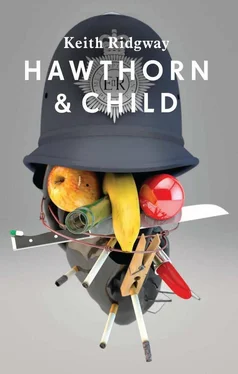David Purley was born in Bognor Regis of all places. I have never been there.
Soldiers sing as they march. They sing as they march.
In his car as he burned to death Roger Williams sang. David Purley never mentioned it. He thought he was hearing things. He thought, when he remembered it, that he was making it up, that such a thing was ridiculous, that it was impossible, that it was impossible and wrong to remember it, so he never mentioned it. He never said a word. Roger had sung. Sang. Roger sang.
I am going to get better.
He sang a melody that Purley had never heard before. I don’t know what it was. Something lovely. Purley sang it himself when he crashed his aerobatic biplane into the sea in 1985. Off Bognor Regis of all places, in sight of home. He remembered the melody that Roger had sung. Sang. And he sang it too. It is a death song, I suppose. Death needs its orders, its boots, its motivations. Death needs its rations.
Poor death.
My sister brings most of the food I need. It lasts the week. I am embarrassed more than anything about my sister. About myself in relation to my sister.
I am tired of talking.
The pains in my stomach are now sometimes unbearable. I listen to them sing. The pains, I mean. They sing. They keep themselves chipper with songs. Because it is hard to be a pain in me. It is hard work. It takes all day to use up a minute of my time. It takes a great effort of all those little pains, working together, to make the song, the chorus, that sounds in my head like a world. These days they have learned their song and they seem happy in their work and they can on a good day lay me low and kill me. They kill me and I die. And I am resurrected.
What did I say to him? To Mr Blair? What statement did I make, what question did I ask to prompt his attack on me? Or was it something in my face or my bearing or in my eyes. Something in my eyes? Was it a story I told, of something in my life? Was it a joke I made? What did I do to Mr Blair? What offence or danger did I present? What was it about me that led to his decision? Perhaps nothing. Perhaps it was an accident of timing. He felt the need to destroy something. Anything. Given his power. It would be a sin, perhaps he thought, not to use it.
Maybe he felt I would be better off.
He thinks a lot, I imagine, about sin. Uselessly.
Death will come to him as a terrible shock, I shouldn’t wonder.
Maybe he detected my unhappiness in my work. My unhappiness at home. Maybe he felt that I would be better off with all that misery behind me. Maybe he felt that my life needed shaking up. That I could do with a shock, upending and run through. The pains started the very next day, when I woke. I could not move. I could not move for days. All my limbs, my joints, my knuckles and my hairs, all my ducts and patches. They were all tuning up.
The man in Sparrow’s looked at me blankly.
— What?
— Are you a journalist or a writer?
He had a settled face. A man in control of his expressions. I couldn’t read anything in there. He’d finished his eggs, his toast. His plate was pushed aside. He had a second mug of tea on the go. Did he do that every morning? I didn’t know. He was reading about global warming in the newspaper. There was a picture of a glacier and sidebars with explanations. His phone sat on his notebook. There’d been no calls this morning, and no writing either. His voice was level. I couldn’t get the accent. Flat south-east. London, out of Essex or Kent. I don’t know. His face wasn’t as crooked up close. Odd that. I find it difficult to talk to people.
— I’m neither.
— I thought you might be. A writer. A journalist. With the notebook. You know.
He nodded, slowly.
— No.
— OK.
I didn’t know where that left me. If he said he wasn’t then he wasn’t. I couldn’t start an argument about it.
— I’ve seen you in here, you know. With the notebook. Writing. The odd time. I just thought. We’re often in at the same time.
He nodded again. Maybe he was tired. He looked tired and sad and red-eyed. He didn’t seem to mind, but he wasn’t going to talk to me. He wasn’t going to ask me to sit down. He wasn’t going to ask me to sit down and tell him about Mr Blair and the device so that he could tell my story.
I thought I would tell him my name. I’d say my name, my surname, and I’d hold out my hand for him to shake. And I’d smile, and he’d pause and smile back and take my hand and ask me to sit down. So, we eat breakfast here , he’d say. Or. You must be local, too . Or something like that. A small talk interregnum. Then down to it. I’d duck into it. I’d use dialogue. I’d speak in dialogue. In lines. You want to hear a story? I’d say. He’d shrug. Politics , I’d say. Politicians. Not quite what they seem, sometimes . I’d pause. Go on , he’d say. You remember Blair? Interested. Of course I remember Blair. What about him?
And so on.
I didn’t know what to say.
— Well. Nice to talk to you.
He nodded again.
— Bye now.
— Bye.
He sipped his tea and looked at me. I walked to the door and out on to the street. I don’t know. I don’t know what to do with the rest of my life.
Mr Blair is not the owner of his own evil. He is the host if you like — if you want to use the sort of terminology that he has adapted into his own life and heart, the vocabulary of the groping church — he is the possessed corpse of a former human, animated entirely by the spittle-flecked priests of Rome and by miserable justifications, by ointments of the sagging flesh, the night-time coldness of the awful touch. His skin is a manila envelope. It contains an argument, not a heart. But he has made choices and the choices are owned by him, and he owns those choices and he is the chooser of death. He is the chooser of death. He has chosen death and he has chosen to visit it on others when no such choice was necessary. He is the progenitor of the crushed skulls of baby girls. He is the father of the dead bodies of children and the raped mothers and the bludgeoned fathers. He has embraced the murder of his lord, and he has used the people to enact his fantasy and his perversions. He has masturbated over the Euphrates. He has rubbed History against his cold chest like a feeler in the crowd. Like a breather, interferer. Slack muscle of pornography, piece of shit.
I only know what I believe.
I go down sometimes to the square, and I wander with a coffee and I watch and I go around again. Nothing happens. I have to be careful. Even still, I’m sure I’m noticed.
I saw him once. Early in the day as I came from Marble Arch. He was no more than a blur between his house and his car; a man in a suit, moving as if it was raining, crouching out, ducking in. I stopped in my tracks. Words rose in my throat. I had no idea. I didn’t know what to do. It was such a beautiful morning.
He glanced in my direction and I saw his face. He did not look at me but I saw his face. He looked terribly familiar. Of course. But no. Not as himself. He wears a state of shock. He carries panic in his eyes. He bristles with tension and fear, as if he knows what he does not want to know — that any moment now, it will be too late.
I went home and slept.
There are too many photographs of David Purley attending to the dying of his friend Roger Williamson. There is too much film. His human body makes too much of itself, changing direction, pausing, giving up, resuming, going back, tensing in fear, resuming, slumping in despair, ragged in despair, resuming, going back, screaming, his voice, you can see his voice in the pictures, screaming, somebody fucking help me, somebody fucking help .
There are two sorts of pale skinny Englishmen in my nightmares. One is burned at the edges, frayed by fear, his blistered hands and scorched face taut with the effort of trying to save a life. David Purley. And the other, a coward and a traitor, who set his face against bravery, who embraced the dying man and swallowed his song. Tony Blair.
Читать дальше












